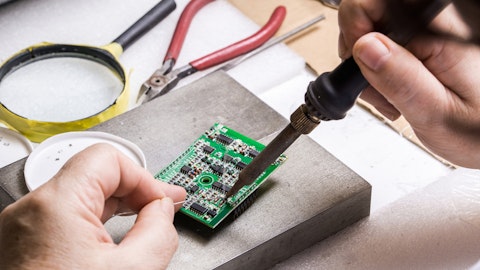Data I/O Corporation (NASDAQ:DAIO) Q3 2023 Earnings Call Transcript October 26, 2023
Data I/O Corporation misses on earnings expectations. Reported EPS is $-0.01 EPS, expectations were $0.02.
Operator: Good afternoon everyone and welcome to the Data I/O Third Quarter 2023 Financial Results Conference Call. All participants will be in a listen-only mode. After today’s presentation, there will be an opportunity to ask question. Please note, this event is being recorded. At this time, I would now like to turn the floor over to Jordan Darrow, Investor Relations. Please go ahead.
Jordan Darrow: Thank you, operator, and welcome to the Data I/O Corporation third quarter 2023 financial results conference call. With me today are the company’s President and CEO, Anthony Ambrose, and Chief Financial Officer, Gerry Ng. Before we begin, I’d like to remind you that statements made in this conference call concerning future revenues, results from operations, financial position, markets, economic conditions, supply chain expectations, estimated impact of tax and other regulatory reform, product releases, new industry partnerships and any other statements that may be construed as a prediction of future performance or events are forward-looking statements, which involve known and unknown risks, uncertainties, and other factors, which may cause actual results to differ materially from those expressed or implied by such statements.

A close-up of a tech engineer soldering a modern system-on-chip circuit board in a laboratory setting. Editorial photo for a financial news article. 8k. –ar 16:9
These factors include uncertainties as to the impact from global and geopolitical events, international trade regulations, order levels for the company, and the activity level of the automotive and semiconductor industry overall, ability to record revenues based on the timing of product deliveries and installations, market acceptance of new products, changes in economic conditions and market demand, part shortages, pricing and other activities by competitors and other risks, including those described from time-to-time in the company’s filings on Forms 10-K and 10-Q with the Securities and Exchange Commission, press releases, and other communications. The accuracy and completeness of forward-looking statements should not be unduly relied upon.
Data I/O is under no duty to update any of these forward-looking statements. And now I would like to turn the call over to Anthony Ambrose, President and CEO of Data I/O.
Anthony Ambrose: Thank you very much, Jordan. I’d begin my formal remarks by addressing our 2023 third quarter financial and operational performance and then I’ll turn it over to Gerry Ng for a more detailed look at our numbers. We have a strong year-over-year revenue growth of 25% through the first three quarters of the year and more recent challenging business conditions in Q3. As I mentioned in the release, the third quarter was mixed. We won some very exciting deals and saw strength in adapter bookings, but system bookings were soft as customers deferred capital purchasing decisions into the fourth quarter. We also saw customers move delivery dates from Q3 to early Q4, which we do not normally see. For whatever reason, whether it be the strike in North America, interest rates, people coming back for vacation, it appeared that customers wanted to take another look at their capital purchase decisions and did so by pushing from September into Q4.
Now, what’s interesting is Q4 is starting out extremely well as we booked five systems already in October. Several of these systems originally were planned for Q3 bookings actually had the bookings occur in October. I was also happy this morning to see the news that Ford and UAW have reached a tentative agreement likely ending their strike. This will remove some uncertainty in North American market. When we look at Q4, given all the puts and takes, we have a strong sales funnel that supports a much stronger bookings than we saw in Q3 and operations that support stronger revenue than we saw in Q3, provided we get the orders in time to ship this year. Despite the short-term gyrations, the driving forces and long-term growth thesis for Data I/O remain intact.
Advanced semiconductors and microcontrollers are finding their way into more products and impacting virtually every business in a measurable ways. Programming is becoming more complex and the amount of code is continuously increasing. Our plan is to grow revenues in growing markets, including automotive and industrial, continue to drive more revenue from consumables, software, and service; and deliver 40% operating leverage on that revenue growth. Automotive represented about 63% of the bookings in the third quarter, consistent with our year-to-date numbers. Within automotive, we continue to see strength in EVs globally. And we like EVs, not just because they’re electric vehicles, but because the platforms are newer and they tend to have more electronics per car as they have comprehensive IVI, ADAS, and other features.
With this content and EVs is estimated to be about two to three times that of semiconductor content and other vehicles, and the programming requirements continue to require — continue to grow in these EVs. Regionally, we continue to see strength in North America. We have seen softness in EMEA. China is recovering from a soft first half, recovering slowly and steadily, which we believe will continue based on our channel checks. In the third quarter, we added four new customers, which now brings us to 19 for the first nine months of the year compared to 20 of all last year and the prior year. Within those four new wins, we had two new EV factories internationally. And one of the new customers in the third quarter represents a major win for us on SentriX.
We’re excited to move further into expanding the SentriX market by winning our first major solar energy customer on our SentriX security deployment platform. This continues to make progress for SentriX as a leading technology platform, now including AI, EV, data center utilities, industrial, and now solar markets. That’s a nice bridge here as we go from solar to sustainability and ESG. Green Power, ESG and climate disclosures are becoming increasingly important for public companies like Data I/O. For us, we see three basic requirements for our environmental strategies. First, as a leading supplier to the automotive industry, we must comply with purchasing requirements set forth by our largest customers. Many of our large EMEA-based Tier 1 automotive customers and many industrial customers have put forth their own ESG plans, calling for a significant reduction in greenhouse gas emissions from their suppliers.
Second, as a public reporting company, we must comply with appropriate rules and regulations set forth by the SEC and NASDAQ. There are new disclosures required for companies starting next year. As a smaller reporting company, these will become effective for us starting next year and continue to increase in disclosure requirements over the next several years. And finally, as a good corporate citizen, we need to look at smart ways to be more environmentally friendly, consistent with the good use of cash. The importance of ESG and how it impacts our business operations will be the first subject in our next fireside chat series. The session will be entitled sustainability strategies for the auto industry and will be released and available for viewing later this month.
In that session, you’ll hear how we’ve made outstanding progress in our Scope 1 and Scope 2 emissions well ahead of regulatory and supply chain requirements and are in the programming industry and sustainability. In the months that follow, we plan to release five additional fireside chat sessions covering global perspectives on critical topics and emerging market trends from automotive to semiconductor growth opportunities. In addition to the fireside chats, we’ve expanded our investor communications content and channels with new technology discussions on LinkedIn and we also recently joined the Weebo Corporate Connect Service platform to enhance our communications with tech-savvy retail investors. Weebo will provide us direct exposure to the second largest app-based investment and trading platform.
As you can tell, we’re excited for the future growth of Data I/O and look forward to sharing our progress in perspective with you and also with these new channels. This will include some fresh ideas from Jerry that goes well beyond our operational spending discipline that he demonstrated in the third quarter. He’s focused on our ability to drive margins, improve cash flow and invest in future growth. With that, I’ll turn the call over to Jerry for a little bit more detail on the numbers. Jerry?
Gerald Ng: Thank you, Anthony and good day to everyone. I look forward to my first and future earnings update have been taken over as CFO on August 16. I will start with the balance sheet and then move to the income statement. My commentary today will focus on specific points of interest and allow you to review the earnings release for a more detailed understanding of our Q3 financials. Data I/O’s financial condition remains strong at the end of Q3 was $11.9 million in cash, up $357,000 from $11.5 million at the beginning of the year. Cash and working capital at $18 million had a comparable increase of $520,000 and from $17.6 million at the beginning of the year. Receivables at $4.9 million increased $175,000 from the previous quarter.
Day sales outstanding, or DSO, was at 39 days at the end of Q3. Past due receivable balances greater than 30 days remain very low at less than $30,000 on September 30th. Payables at $1.1 million decreased by $468,000 from the previous quarter. Moving on to inventory. We finished at $6.4 million, a decline of $476,000 from the previous quarter. Inventory had been intentionally elevated in 2020 to address potential shortage risk. Earlier this year, we went to a more neutral supply chain strategy, improving supply chain conditions, disposition a material for end-of-life products and our lean operational initiatives contributed to our overall reduction. Optimizing inventory levels remain a top priority, while balancing anticipated customer demands going forward.
Moving to the income statement. Revenue at $6.6 million declined $651,000 from the prior year on lower bookings performance in the current quarter and strong shipment recovery in Q3 of the prior year due to the supply chain disruption that occurred in the first half of the prior year. Revenue through the first months of this year was $21.2 million, up $4.2 million or a 25% increase from the prior period. Our Q3 ending backlog was $2.5 million, down from $3.8 million from the previous quarter. As Anthony indicated, automotive electronics continues to be our primary addressable market at 63% of year-to-date bookings. Gross margin at 54% in Q3 was down from 59% in Q2, due primarily to lower sales volume, lower inventory levels, and related absorption of relatively fixed cost for our manufacturing and service operations.
Good news is direct material and other variable costs declined in line with revenue change. Operational expenses at $3.6 million increased 5% from the prior year, with R&D representing the majority of the increase, while G&A remained relatively flat. Rate strides were made in reducing our Q3 costs with a decline of $626,000 from the prior quarter. A critical review of spending was performed, non-critical cost reduced or eliminated, and of course, operational efficiencies increase. Excluding costs related to sales volume changes, we expect to maintain this strong operational discipline in Q4 and 2024. Currency transaction impact was minimal in Q3 was $15,000 loss compared to a $307,000 gain in the prior year from, of course, a strengthening dollar.
Net loss of $53,000 in Q3 compared to a net income of $847,000 for Q3 of 2022 was due largely to the change in revenue and lower FX gain from the prior year. Net income remains positive, however, at $342,000 through nine months compared to a net loss of $1.6 million for the similar period in 2022. Adjusted EBITDA was $400,000 in Q3 and increased to $1.8 million through nine months of this year. This represents a year-over-year improvement of $1.3 million. Overall, we remain very strong financially with no debt and in a good position to navigate market dynamics. We have return to profitability on a consolidated basis, but we will be able to take advantage of our NOLs, which stood at $15 million on September 30th. I am excited to be part of the Data I/O team and look forward to working and partnering with Anthony and our global team to continue improving our operational and financial performance.
This concludes my remarks for the third quarter of 2023. Operator, would you please start the Q&A process?
See also Duquesne Family Office’s 15 New Stock Picks and Hedge Fund Manager Louis Bacon’s Top 12 Stock Picks.
Q&A Session
Follow Data I/O Corp (NASDAQ:DAIO)
Follow Data I/O Corp (NASDAQ:DAIO)
Receive real-time insider trading and news alerts
Operator: Ladies and gentlemen, we’ll now begin the question-and-answer session. [Operator Instructions] Our first question today comes from Kevin Garrigan from WestPark Capital. Please go ahead with your question.
Kevin Garrigan: Yes. Hey good afterbody and thanks for letting me ask a question. On the EV front, and congrats on the new EV factory customers, not saying that you’ll supply every factory out there, but is it a safe assumption that you’d supply kind of one system per factory? Or is there a possibility that multiple factories would use one system like a programming center or something like that?
Anthony Ambrose: Yes. So, Kevin, good to hear from you. In general, I would say, on average, we supply more than one system per factory in the automotive space. And that’s just based on an analysis. I mean, it ranges from — we have a number of customers with one factory or one system per factory. I’ve been in places that have 10 systems in a factory. So, the average is certainly going to be more than one. For us, we see the growth in automotive coming from — again, the focus on new factory acquisition. As customers expand in certain areas of the world, we want to be their choice as they put programming capacity in place in those new factories. We think that’s a good predictor of what their future demand will be in that factory. And then, of course, people that have been with us for years are placing additional capacity orders as again, they have more and more electronics going into their cars, and they need to add capacity. So, it’s really a combination of both.
Kevin Garrigan: Okay. Got it. Got it. That makes sense. And then are you getting a lot of prior customers that already have a PSV system that are asking to add SentriX capabilities?
Anthony Ambrose: The customers — the short answer there is most of our SentriX demand today continues to come from people that have the system already. That includes our programming center partners and a handful of nonprogramming center customers.
Kevin Garrigan: Okay, perfect. And then just one last quick question. So, looking at your customer additions, you had started out the year adding 10 customers in Q1, and then that number has kind of come down as we’ve gone through the year, but you’re still on pace to surpass your 2022 customer additions. Are — what is kind of keeping some potential customers on the sideline?
Anthony Ambrose: I think the numbers in any quarter are going to have some lumpiness to it, that’s the nature of our business. That’s why we give you the data on the quarter and then also try and provide some context with the year-to-date numbers as well. For us in Q3, we probably would have had more new customers if people have bought more systems. As I mentioned, it seemed like people just didn’t want to place any orders towards the end of the quarter. And then once the quarter flipped over, it’s like the spigot turned back on. I don’t know whether they didn’t want to have it on their books. I don’t know whether it was the uncertainty created by the factors I described earlier, strikes, other stuff as well, interest rates. But at the end of the day, we believe that there’ll be more capacity demand because there’s more silicon going into cars and it needs to get programmed. It’s not really any more complicated than that.
Kevin Garrigan: Okay. Perfect. Thank you very much.
Anthony Ambrose: Thanks, Kevin.
Operator: Our next question comes from David Marsh from Singular Research. Please go ahead with your question.
David Marsh: Hey guys. Thanks for taking the questions. I guess I’m just trying to — Anthony, I’m just trying to read the tea leaves here a little bit on your comments on China. It sounds like there is some sort of recovery taking place, but it doesn’t sound like it’s a robust and fast taste recovery. I was just hoping that you could provide us a little bit more granularity there? And just help us understand–
Anthony Ambrose: David, I think tea leaves is probably an appropriate metaphor for the future forecasting there. I think you nailed it. That’s exactly what I’m trying to say. We’ve had continuous improvement throughout the year, but it’s at a level of business that’s lower than last year. We still haven’t gotten to that level. I think it will — you’re going to continue to see more recovery there. And consistent with the fact that China produces and consumes an awful lot of cars and 30% of them are EVs.
David Marsh: Right, right. That’s — yes, that’s helpful. I guess it’s just it’d be really it’d be really helpful to get a better sense of what that pace is going to look like going forward. But I guess it’s really very difficult to predict.
Anthony Ambrose: Yes, I think there’s a lot of third-party information there. I mean you can sort of pick the forecast you want. A lot of people are nervous about the property market in China. A lot of people are nervous about are people continuing to still build there. We just had a trade show there, very well attended, probably the best attendance in three or four years. And as I said, I would expect a continuous steady improvement. I don’t think you’re going to get a massive sudden uptick, but I think it will be better as we go forward.
David Marsh: Got it. Got it. That’s really helpful. And then just as my follow-up, I guess one of the things that took me be a bit by surprise, and I think you addressed it a little bit, but I just kind of wanted to pull the thread on it. Your backlog is down from 3.8% at the end of Q2 to 2.5% at the end of Q3, but based on your commentary, it actually sounds like bookings have picked up as we’ve entered the new quarter. So, just with all of that information, I mean, I’m reading into your commentary that Q4 could be sequentially better, but I just was wondering if you might just help us with the information that you have today just kind of get a better understanding around that.
Anthony Ambrose: Yes, I think the tough thing for us is we don’t give the quarterly guidance. But as I indicated in my remarks, I certainly think the bookings will be better Q4 and Q3 and the revenue, given our sales funnel that we still have in the funnel that have not yet booked, we have an opportunity to have a strong revenue quarter as well, provided the timing is such that we can book and ship some of those systems. So, the funnel looks good. We just have to deliver on it and we’re off to a good start.
David Marsh: Great. That’s helpful. Thanks. I’ll jump back in the queue.
Anthony Ambrose: Thanks a lot Dave.
Operator: Our next question comes from David Kanen from Kanen Wealth Management. Please go ahead with your question.
David Kanen: Hi thanks for taking my questions. I’ve got a few. So, if it’s okay to bend the rules a little bit, I’d appreciate that. The first one is in regards to — you said five system orders so far in the quarter. What are ASPs on systems?




